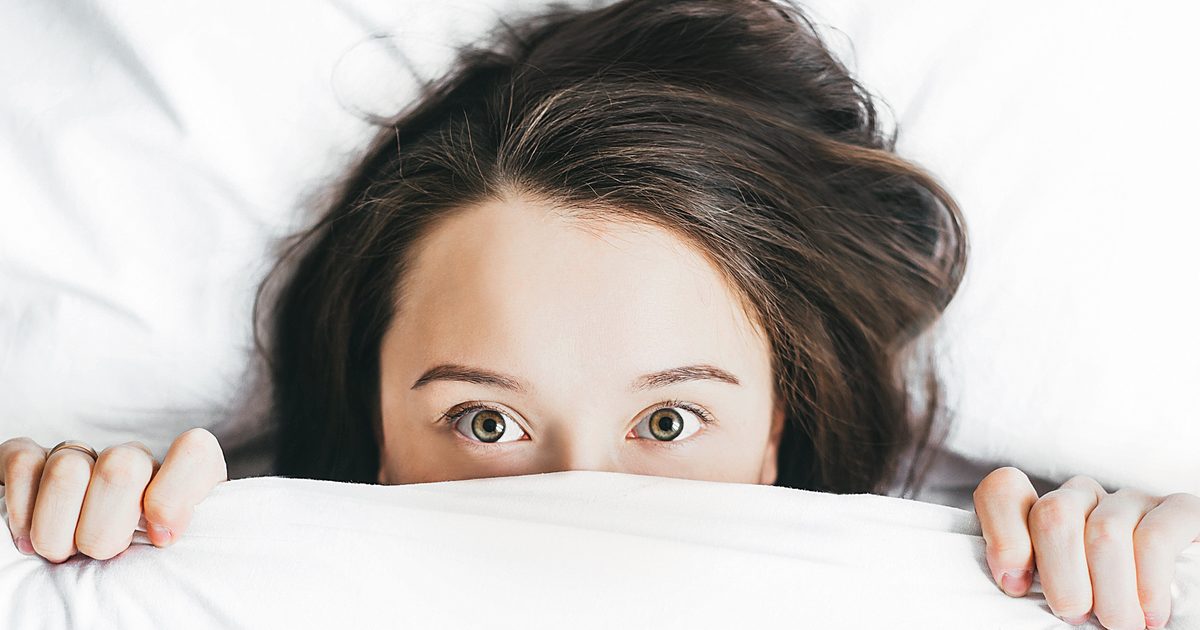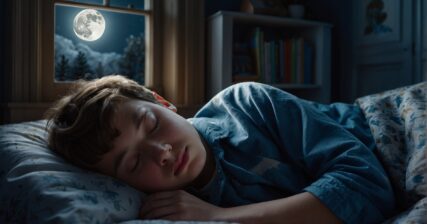Listen on: Apple Podcasts | Spotify
What are the best sleep hacks? What’s the difference between deep sleep and REM? Which supplements support better sleep? These are just a few of the common questions people ask about sleep.
In this blog post, I’ll do my best to provide you the answers to these questions and many others.

Feel Better Fast. Guaranteed.
Energy+, EDGE, and MentaBiotics make up the Happy Juice supplement stack, with ingredients clinically proven to:
- decrease anxiousness scores by 55%
- decrease irritability scores by 60%
- decrease fatigue by 64%
- decrease anger 54%
- decrease tension by 45%
- decrease confusion by 43%
- decrease overall distress by 49%
- increase good bacteria by 70%
- decrease negative mood by 105%
- increase positive mood by 211%
What are the phases of sleep?
Your body has an internal clock, which, when it’s working well, determines the ebbs and flows of hormones and neurotransmitters, manages many of your body’s systems, and guides you to sleep, wake up, nap, and move. Your internal clock is found in the suprachiasmatic nucleus (SCN).
Your environment also affects your circadian rhythm. External influences on your circadian rhythm are called Zeitbergers. Light is the most powerful Zeitberger, but diet, exercise, and supplementation also influence the SCN.
Messing with your circadian rhythm can have catastrophic effects on your health. For example:
Heart attack rates jump 25% the Monday after the clocks change to Daylight Savings Time.
That single-hour shift in your schedule does a lot of damage. It makes you wonder why we even mess with Daylight Savings Time anymore.
When your circadian rhythm is normal, you cycle through three phases each night.
Light sleep: During light sleep, you’re semi-conscious. You’re aware of your environment but only respond to something unexpected, such as the creaking of a door or your spouse whispering seductively in your ear. You have enough awareness to make sense of what’s happening but are asleep enough that you’re often unmotivated to move unless you sense a threat, or you’re a newlywed.
When you’re under a substantial amount of stress, you can spend most of your night in this phase, and miss out on the benefits of the next two phases. Under normal circumstances, you remain in this phase for 10-30 minutes and then transition to deep sleep.
Deep sleep: This phase supports your body’s growth and repair. Growth hormone peaks during deep sleep, which supports tissue repair and fat metabolism.
Rapid Eye Movement (REM): REM supports your brain’s growth and repair. Your vibrant, funny, terrifying, exciting, and disturbing dreams occur during REM, as your brain tries to make sense of what’s been on your mind, and consolidate information into memories.
REM makes up 20-25% of your total sleep time but varies throughout the seasons. The average person gets about 16% more REM in the winter than in the middle of the summer.
Your brain gets “washed” in cerebral fluid to help remove toxins, and neurogenesis, or the growth of new brain cells, increases. Chronic sleep deprivation limits your body’s ability to generate new brain cells.
Oh, and one last bit of interesting trivia: Penile erection and clitoral swelling occur during REM as well. For guys, lack of a morning erection is a sign of low testosterone or insufficient REM sleep.
I wanted to highlight that point because I work with a lot of 40+-year-old men. When they notice their libido is low or it’s been a long time since they had a morning erection, they often ask about testosterone boosters or hormone therapy. Often, what they need is sufficient, consistent sleep.
How much sleep do you need?
The following table, based on recommendations by the National Sleep Foundation, shows the amount of sleep each age group needs. Notice the significant amount needed by newborns to toddlers need. If parents want to develop healthy kids, they must help them get enough sleep every night.
| Group | Ages | Ideal Sleep |
| Older Adult | 65+ | 7-8 |
| Adult | 18-64 | 7-9 |
| Teenager | 14-17 | 8-10 |
| School Age | 6-13 | 9-11 |
| Preschool | 3-5 | 10-13 |
| Toddler | 1-2 | 11-14 |
| Infant | 4-11 months | 12-15 |
| Newborn | 0-3 months | 14-17 |
How does sleep affect your hormones?
The following table outlines what happens with your hormones and neurotransmitters at night.
| Hormone / Neurotransmitter | Effect From Sleep |
|---|---|
| Growth Hormone | Highest secretion of 24-hour cycle occurs during deep sleep, and is secreted in pulses with each cycle back into deep sleep. |
| Prolactin | Rises 30-90 minutes after onset of sleep. |
| Thyroid Stimulating Hormone (TSH) | Peaks in evening and decreases throughout the night, suggesting that thyroid hormones (T3 & T4) rise as night progresses. |
| Testosterone | In men, secretion is lowest at ~8 pm, and peaks about 8 am (which is why it’s best to get blood testing done first thing in the morning). |
| Melatonin | Rise begins at bedtime and peaks between 3 am-5 am. |
| Leptin | Increases to curb appetite. |
| Cortisol, Epinephrine, Norepinephrine | Stress hormone and neurotransmitters decrease during sleep, and rise leading into the morning wakeup time. |
What are the effects of sleep debt?
The term “sleep debt” paints an accurate picture of what you do to your body when you get too few hours each night or get enough hours, but you don’t achieve deep restorative sleep.
| Effects Of Sleep Debt | |
| Elevated Cholesterol | Reduced Testosterone |
| Insulin Resistance | Obesity |
| Metabolic Syndrome | Type II Diabetes |
| Elevated Cortisol | Muscle Loss |
| Increased Appetite From Leptin & Ghrelin Dysfunction | Disrupted Gut Bacteria |
| Depression | Increased Inflammation |
| Reduced Immune Function | Increased Pain Sensitivity |
| Decreased Libido | Body fat gain |
Insomnia actually increases metabolic rate. One study showed a year of insomnia increased resting metabolic rate by a whopping 11%!
Yet, even though insomnia raises metabolic rate, those with insomnia still get fat, even when they eat well and exercise appropriately. That sure shoots another hole in the “calories in, calories out” hypothesis.
Weight gain from sleep debt isn’t a calorie balance problem. It is a hormonal balance problem.
One night of disrupted sleep causes insulin resistance the next day. Two nights causes dysfunction of your medial prefrontal cortex (MPFC), which deteriorates your mood.
A week of getting only five hours of sleep decreased testosterone by 10-15% in men.
In women with sleep debt, for each additional hour of sleep they got, their likelihood of having sex the next day increased by 14%, suggesting sleep debt robs you of your libido.
Animal research shows that sleep debt increases sensitivity to pain, meaning that as you lose sleep, aches, pains, and conditions like fibromyalgia can worsen.
The liver produces more than 600 metabolites. About 60% of them depend on a normal circadian rhythm.
Does sleep deprivation cause brain damage? Long-term sleep debt does cause cognitive decline. Also, many neurodegenerative diseases like Alzheimer’s or Lewy Body dementia cause deep and REM sleep reductions. The loss of REM sleep further contributes to cognitive decline.
How does stress impact sleep?
Holding onto stress, and the emotions that accompany it causes a cascade of hormones and neurotransmitters that keep you from sleeping well, and further disrupt your metabolism. Unresolved stress can lead to adrenal fatigue.
While you work out the details on how you’ll handle the stress, the following supplements have been shown to help reduce feelings of anxiety, calm your mind, and/or support more restful sleep. The more quality hours you get, the more resilient you become to the stressors you face.
- Relora: Relora® is a combination of Magnolia and Phellodendron extracts. I was first introduced to Relora by Dr. Jim LaValle, author of Cracking the Metabolic Code. Relora has been shown to support normal stress hormone levels, relieve feelings of tension, anger and fatigue, and supports feelings of vigor and good mood.* I use and recommend Relora Plus from Thorne.*
- Essential Oils: A number of studies show essential oils support a normal stress response, calming the mind, and aiding sleep, including bergamot, orange, lavender, lemon, rose, cedar, Roman chamomile, angelica, and ravensara.*
- Magnesium: Magnesium has numerous effects on the body and brain, one of which is to help calm the mind. Low magnesium levels dampen serotonin production, so if your magnesium is low, supplementing with magnesium glycinate may help you calm your mind and get to sleep.*
- Hemp Oil: Hemp oil and other phytocannabinoids have been shown to reduce feelings of stress and support better sleep.*
How does shift work affect sleep?
Cortisol is at the crux of the shift work problem. Your cortisol should reach its peak once per day, just as you wake up. However, suppose you wake up at one time for a job during the workweek and a different time on the weekends. In that case, you disrupt the normal cortisol rhythm and cause chronically elevated levels.
Constantly elevated cortisol levels cause weight gain, especially in the belly, along with muscle loss, increased heart disease risk, inflammation, immune system suppression, cognitive dysfunction, and mood changes.
Suppose you are a shift-worker and want to maintain your health and avoid obesity. In that case, you must stick to a consistent, seven-hour (or more) sleep schedule with a regular bedtime every day, and avoid snacking on convenience foods and energy drinks.
While you can use supplements and nutrition to minimize the negative impact of shift work, sticking to a consistent schedule is the most important. If you don’t, you should expect to experience numerous health problems in the future.
How does alcohol affect your sleep?
Alcohol helps you fall asleep but harms the quality of your sleep.
Drinking “every once in a while,” compromises your REM sleep the night you drink. Interestingly, those who drink every night seem to regain their REM sleep as they develop a tolerance to alcohol. So, periodic alcohol consumption compromises REM sleep, but regular drinking does not.
However, before you justify getting jingled each night, know this: Regular drinking suppresses growth hormone. Low growth hormone leads to muscle loss and fat gain, which explains why regular drinkers often end up with big (a.k.a. “beer“) bellies and scrawny arms and legs.
What are the best sleep hacks?
The following are the habits that have the most significant impact on improving sleep quality.
Go to sleep at a consistent time: For your circadian rhythm to have a rhythm, you have to go to sleep at a consistent time each night. That might mean going to bed at an earlier time than you’re used to, especially if you don’t normally go right to sleep after going to bed.
Melatonin secretion initiates the process of putting you to sleep. But if you keep yourself up with artificial lights, digital screens, and stimulants, eventually your body stops producing melatonin like it’s supposed to. Then, when you want to go to sleep on schedule, you won’t be able to. When improving sleep, the most important thing you can do is to go to bed at a consistent time every night.
If you have a hard time falling asleep, read a book. Your brain waves while reading are similar to sleeping, which is probably why so many people find it easy to fall asleep after reading a few pages but can stay awake for hours while watching a movie in bed.
Turn your thermostat down: The ideal temperature at night is 67-69° Fahrenheit. Because your body doesn’t regulate temperature as well while you’re sleeping, if you get too hot, you’ll wake up.
It is possible to go too low with the temperature, though. Doing so reduces REM sleep. This is a survival mechanism common among mammals. You wouldn’t want to be dead to the world because you’re in a dream while your body is freezing to death.
Eat dinner a few hours before bedtime. Insulin levels should be back to baseline by then, allowing you to fall asleep faster.
Block blue light. Natural light contains some blue light, but we don’t naturally get blue light after dark. Blue light exposure after dark interferes with melatonin production. Many smartphones and laptops now have settings that allow you to shut off the blue light at night. You can also get a pair of blue-light-blocking glasses. I use a pair of Felix Gray glasses right now.
Make your room as dark as possible. No night lights, or status lights shining from your electronic devices. Your skin has sensors that pick up on light, even when your eyes are closed.
Finally, take a warm bath about 90 minutes before bedtime. The bath increases your core temperature. In response, your body increases blood flow to cool itself. When you get out of the tub, your body continues to cool itself, which drops your core temperature below normal, aiding in sleep quality.
What causes sleep apnea?
Half of adult women and a significant percentage of men today suffer from sleep apnea, one of many sleep disorders.
Excessive body fat is the most common cause. As people gain excessive body fat, their necks and throats gain fat too.
The extra fat presses down on the soft tissue in their mouth and throat as they sleep, blocking airflow. Most of the time, the lack of oxygen wakes them up. This happens multiple times each night, causing interrupted sleep, contributing even more to their weight gain.
While a CPAP is helpful, it is not a long-term solution. If you’re overweight and have sleep apnea, using a CPAP is like someone with type II diabetes using insulin. It deals with the symptom but does nothing to fix the cause.
Lose weight so you can breathe at night.
Can I make up for my sleep debt during the week by sleeping in on the weekends?
No. According to the research, you need to be consistent with your sleep. Sleeping in a couple of days per week won’t resolve the problems associated with your debt you’ve acquired from the other nights.
I have kids. How do I get more sleep when they’re up so late?
A teenager who goes to bed at 9 pm and wakes up at 6 am gets 10 hours of sleep. That’s the recommended amount in the table above.
Vanessa and I felt it was essential to lead by example for our kids, so we went to bed at 9 pm, as did Jacob and Brodrick. There was no other option. We turned the house off at 9:00. If your kids are up too late, that’s on you as the parent.
I also realize some kids’ are in sports practice past 9 pm. Do what you can to minimize the late nights, as their brains and bodies are in the middle of a critical growth period.
Which supplements are best to support sleep?
The following are some of the best supplements for supporting sleep. However, they’re not the only supplements. You can get these supplements from the most-respected practitioner brands by ordering through my Wellevate dispensary.
- Magnesium L-Threonate: Any chelated magnesium, such as magnesium bisglycinate or magnesium malate, supports sleep. However, magnesium l-threonate is unique because it was designed to cross the blood-brain barrier. It’s the only form of supplemental magnesium to do so. Research shows it supports overall cognitive function and enhances sleep quality.
- PhramaGABA: Gamma-aminobutyric acid (GABA) inhibits nervous system activity, helping to calm the mind and support sleep. GABA also supports growth hormone secretion. PharamGABA is a patented form of GABA, known for its purity.*
- 5-hydroxytryptophan (5-HTP): 5-HTP is a serotonin precursor that helps regulate your sleep-wake cycle. Research shows 5-HTP works well when used alone, and may be even more effective when combined with GABA.*
- Valerian and Lavender Essential Oils: Valerian and lavender are essential oils, and a plethora of research exists that shows inhalation of the essential oils supports restful sleep. However, the FDA doesn’t consider inhaled essential oils to be dietary supplements, and therefore cannot be sold with health claims such as “supports sleep.” You’ll find valerian and lavender in supplements intended for internal use that carry the claim of supporting sleep, but you may also want to find high-quality essential oils and try them in a diffuser as well.*
- L-theanine: L-theanine is another amino acid that crosses the blood-brain barrier and supports relaxation, sleep, and recovery from exhaustion. Research shows it does not cause drowsiness or leave you feeling “hungover” the next day, in the same way GABA or melatonin might.*
- Melatonin: Melatonin is the hormone of darkness. It’s created from the amino acid l-tryptophan. The pineal gland secretes melatonin at dusk, and levels continue to rise until mid-morning. Melatonin secretion decreases with age, which could be part of the reason older adults sleep less. Melatonin supplementation can be beneficial when traveling across time zones, adjusting to a new schedule, or for older adults. Also, melatonin has been shown to support healthy cholesterol levels, normal inflammatory levels, and can support restful sleep, especially in those with neurodegenerative diseases, depression, chronic fatigue, fibromyalgia, headaches, and insomnia.*
Melatonin stimulates brown adipose tissue while inhibiting insulin production from the beta-cell (insulin-secreting cells of the pancreas): by doing so, melatonin may control body weight via changes in body temperature and energy expenditure whereas, by inhibiting insulin production at night, may favor beta-cell rest. We suggest that prolonging our days with artificial light may favor obesity by inhibiting melatonin production, thus silencing the brown adipose tissue, and may also impair insulin production in the long-term by prematurely exhausting the beta-cell.”
Cizza, et al.
Find these and other sleep-supporting supplements in my Wellevate dispensary.
Final Thoughts
Laugh and the world laughs with you, snore and you sleep alone.
Anthony Burgess
2555. That’s the number of hours, at a minimum, you should sleep each year as an adult. Just as a plane can end up miles from its destination by flying just a degree or two off from its course, you can end up far from healthy and fit by sacrificing just a little bit of sleep, night after night.
A year of falling 30 minutes short each night is 182.5 hours—more than an entire week of lost sleep.
If you got to the end of this long article, and didn’t fall asleep, congrats. My goal isn’t to just write something that’s interesting to read, though. I wrote this to challenge you to take your sleep more seriously. You can always make money back. You can almost always find time to watch another show, or post a status update on social media. But you can never get back your time.
The hours you lose from sacrificing sleep are gone forever. Starting tonight, stop going further into debt, and make the most of the nights ahead of you.

Feel Better Fast. Guaranteed.
Energy+, EDGE, and MentaBiotics make up the Happy Juice supplement stack, with ingredients clinically proven to:
- decrease anxiousness scores by 55%
- decrease irritability scores by 60%
- decrease fatigue by 64%
- decrease anger 54%
- decrease tension by 45%
- decrease confusion by 43%
- decrease overall distress by 49%
- increase good bacteria by 70%
- decrease negative mood by 105%
- increase positive mood by 211%



